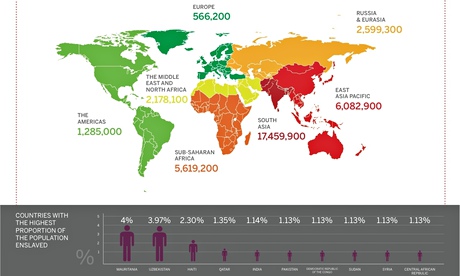Modern slavery affects more than 35 million people, report finds
Five countries including India, China and Russia account for 61% of all slavery, says Australia-based Walk Free Foundation

More than 35 million people around the world are trapped in a modern form of slavery, according to a report highlighting the prevalence of forced labour, human trafficking, forced marriages, debt bondage and commerical sexual exploitation.
The Walk Free Foundation (WFF), an Australia-based NGO that publishes the annual global slavery index, said that as a result of better data and improved methodology it had increased its estimate 23% in the past year.
Five countries accounted for 61% of slavery, although it was found in all 167 countries covered by the report, including the UK.
India was top of the list with about 14.29 million enslaved people, followed by China with 3.24 million, Pakistan 2.06 million, Uzbekistan 1.2 million, and Russia 1.05 million.
Mauritania had the highest proportion of its population in modern slavery, at 4%, followed by Uzbekistan with 3.97%, Haiti 2.3%, Qatar 1.36% and India 1.14%.
Andrew Forrest, the chairman and founder of WFF – which is campaigning for the end of slavery within a generation – said: “There is an assumption that slavery is an issue from a bygone era. Or that it only exists in countries ravaged by war and poverty.
“These findings show that modern slavery exists in every country. We are all responsible for the most appalling situations where modern slavery exists and the desperate misery it brings upon our fellow human beings.
“The first step in eradicating slavery is to measure it. And with that critical information, we must all come together – governments, businesses and civil society – to finally bring an end to the most severe form of exploitation.”
Countries identified as leading the fight to end modern slavery include Australia, Austria, Georgia, Ireland, the Netherlands, Norway, Sweden, Switzerland, the UK and the US. Only Australia, Brazil and the US, however, were making efforts to address the issue in government procurement and the supply chains of businesses operating in there.
Modern slavery is a live political issue in the UK, with a bill on the issue moving through parliament and David Cameron highlighting it in his speech to the Conservative party conference this year.
“But there’s still more injustice when it comes to work, and it’s even more shocking. Criminal gangs trafficking people halfway around the world and making them work in the most disgusting conditions,” Cameron said.
“I’ve been to see these houses on terraced streets built for families of four, cramming in 15 people like animals. To those crime lords who think they can get away with it, I say ‘no, not in this country, not with this party’ … With our modern slavery bill we’re coming after you and we’re going to put a stop to it once and for all.”
Olly Buston, WFF’s movement director, said: “There is still a chance that the modern slavery bill will make Britain’s anti-slavery laws the best in the world. But the draft bill must be strengthened. Children and other victims of slavery need to be properly protected. And the bill must ensure that businesses take action to end slavery in their supply chains”.


